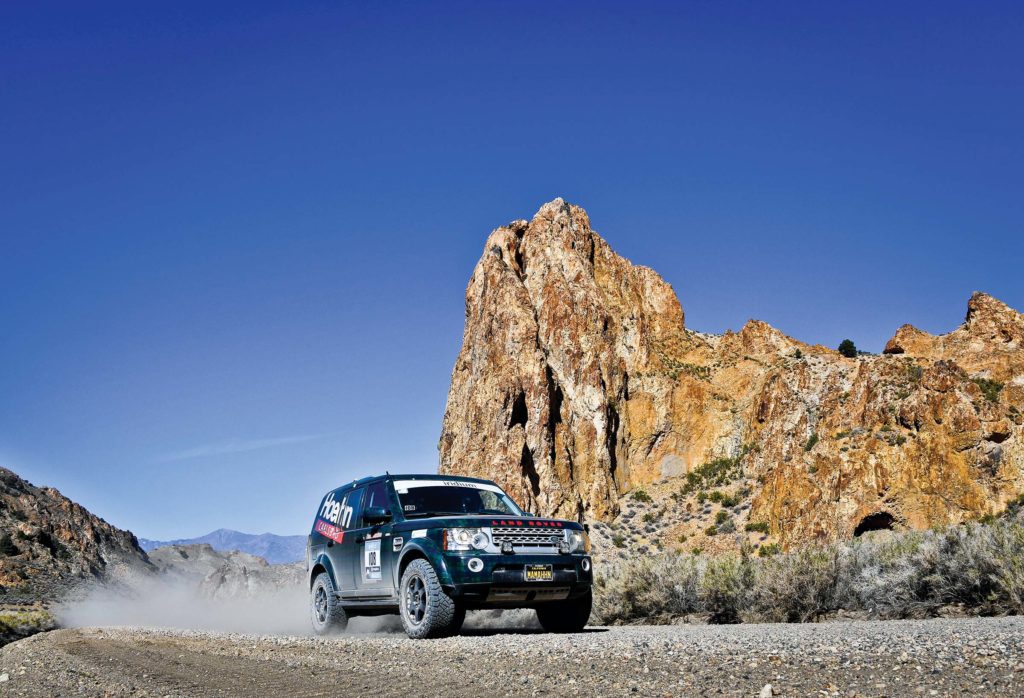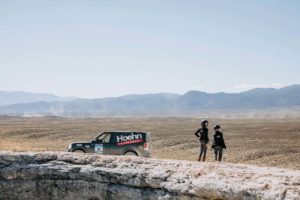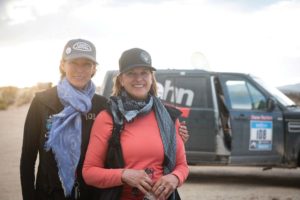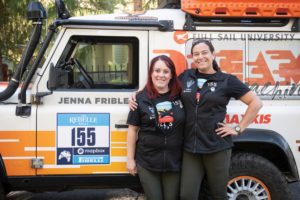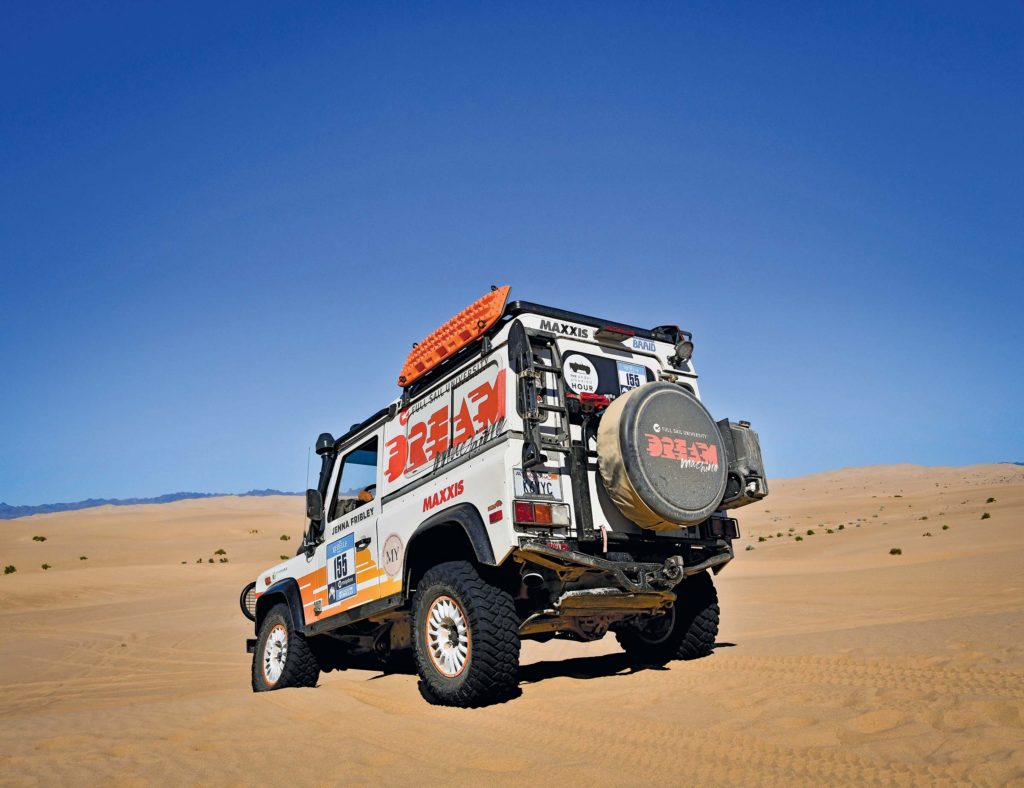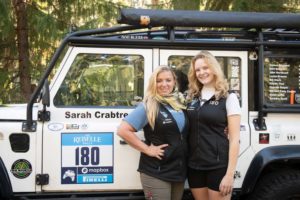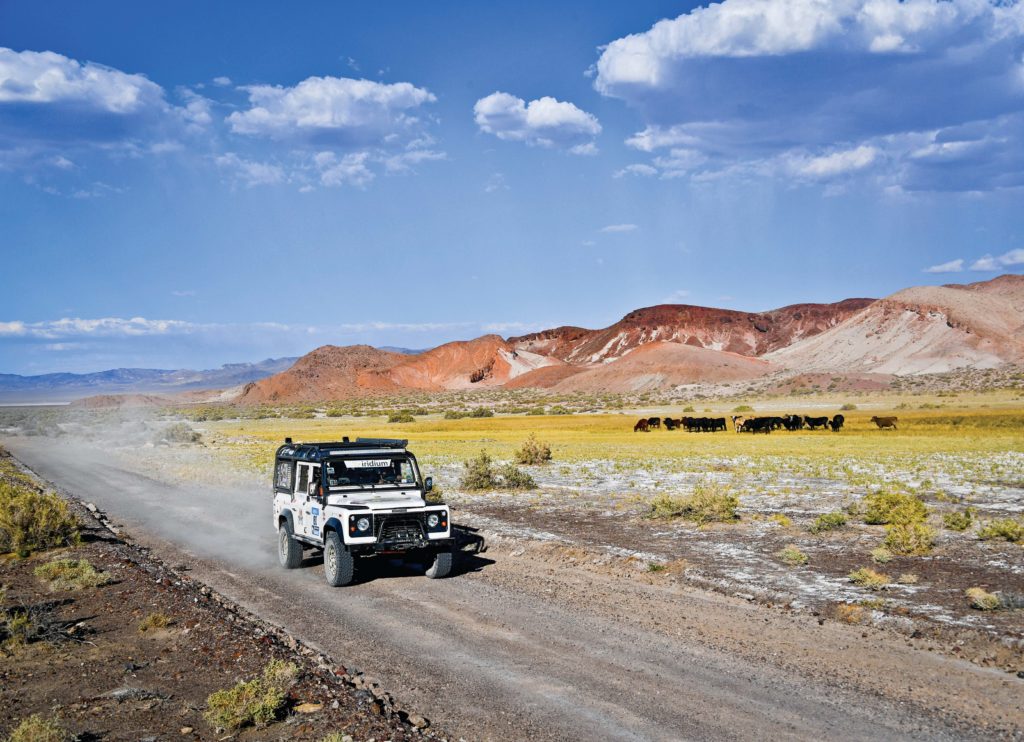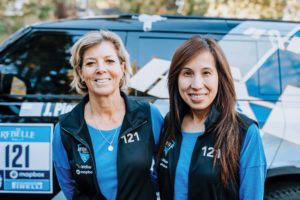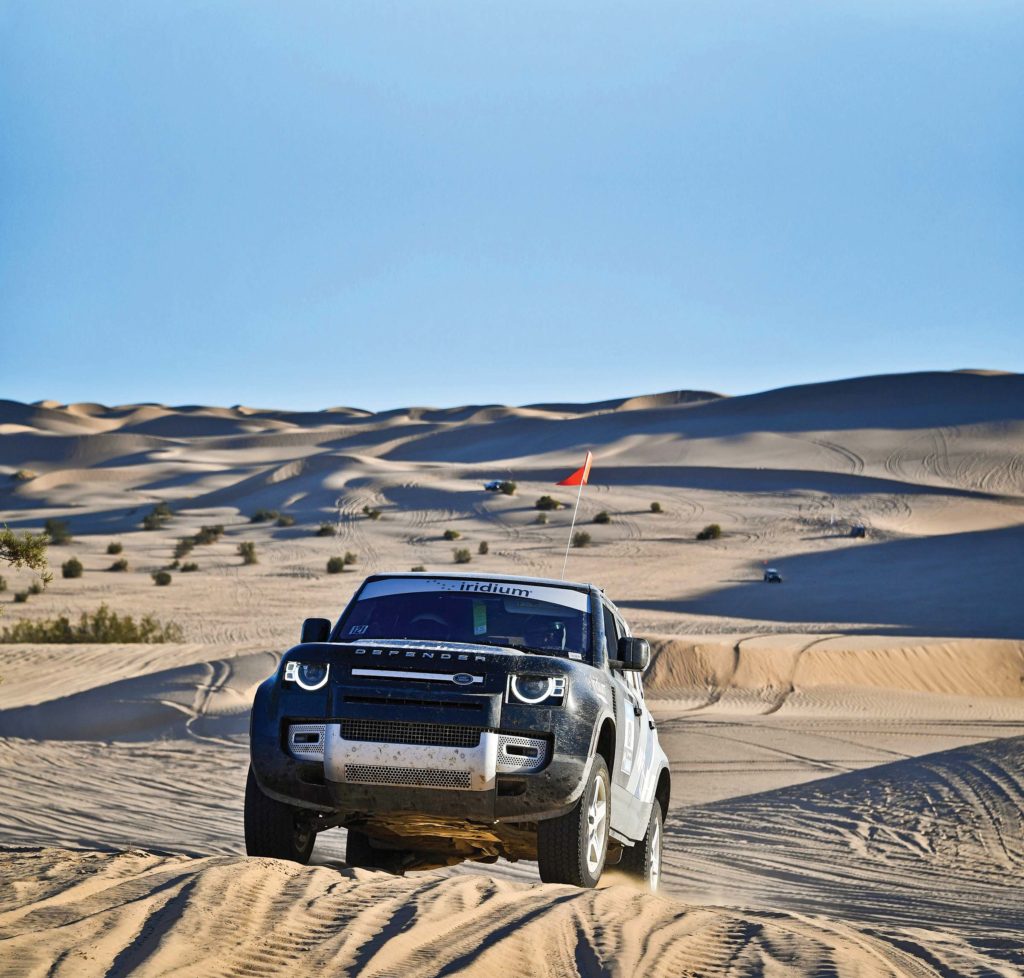I learned more about humility when I ran my first Rebelle Rally in October 2016. On Day 1, I thought it would be more like an open-book test; after all, you have the “answers” in the form of maps, coordinates, and headings. Just find them – how hard could that be? On Day 2, I discovered it would be hard – very hard – but the challenge hooked me into competing in the Rebelle twice more and signing up for the 2023 event next October.
The 7th Rebelle Rally in October 2022 started in Lake Tahoe, CA, stretched into Nevada, and finished in Glamis, CA. For eight extremely taxing days, the competitors covered 1,367 miles of dirt roads, high desert trails, and sand dunes. Fifty-three teams entered this year’s event and a record four ran Land Rovers.
Success in the Rebelle requires intense focus, precision, and endurance from both the driver and navigator. In order to score the most points, teams need to know their exact location on the planet using only compasses, plotters, maps, and rulers – no phones or GPS permitted. You earn points by finding and arriving at three levels of checkpoints: green, blue, and black. Green ones have tall, easily visible flags but have closing times; arrive late and you’re ineligible to score points that day. Blue checkpoints feature smaller flags or short PVC pipes. Black checkpoints exist only on your map – they’re unmarked. Teams record their success using a satellite tracker. Friends and family can track their favorite teams on an app to visualize the terrain.
That’s the dry version; I would sum up the daily challenges as “Checkpoints or Checkmate.”
The Rebelle demands substantial mental focus, 10 hours a day for 8 days. Plotting, mapping, and math calculations all take place at the 5:30 am wake-up call and before breakfast. On a great day, you check into all your greens and blues, even a few blacks; your team map actually looks 3D – you’re on fire and elated. On a bad day (there will be bad days), you start off well and reach some checkpoints, but then all of sudden, you realize you’re lost. The driver and navigator study the map together. One points out land features and tries to find them on the topo maps. You study the trail you were just on and ask yourself, “Were we on the trail we thought we were? Oh, shoot… maybe we are here?” You use some of your navigation tricks, which only work sometimes. You confront “analysis paralysis” – completely unsure of where to go next.
Another team might arrive and you work together. Sometimes you are exactly where you are supposed to be. Sometimes another team blows right past you with confidence, possibly shattering yours. You check the time, realize you have no more to spend, and head to the next green checkpoint so you don’t time out your day. You feel as though you’ve disappointed your family and friends tracking you on the Rebelle app. From there, you start a new stage, and it starts all over again – many times with you recovering and checking in to the majority of your checkpoints. You return to a new basecamp, re-set up your tent, grab some dinner and, if you have your maps for the next day, you study them and then hit the sack.
A special bond exists between all the Land Rover teams. Our shared love of our vehicles makes us check on each other and celebrate our accomplishments – during low moments we commiserate together. Rebelle Rally teams are allowed to collaborate and help each other. However, outside assistance or even a chance meeting with a friend or family member can get you a penalty or even force you to become an unranked team. (Unfortunately, teams have learned that the hard way.)
Interviewing the Land Rover teams at the endpoint of this year’s event only made me yearn harder to complete next October.
Karen Hoehn, Del Mar, CA
Dana Saxten, Encinitas, CA
Team #108, Hoehn Adventures
2013 Land Rover LR4 V8
Hoehn Adventures has competed in every Rebelle Rally, and every year they demonstrate their capabilities – for 2022, they came in 16th overall, earning 72% of the available points. Karen and Dana continue to demonstrate why they won the Team Spirit Award in 2021.
Q: I noticed from following you online that Day 3 was by far the most challenging for you.
A: It becomes hard to track the days, but I think you’re referring to a day that we had lots of mountain trails. They can be very tricky to navigate. We went down a trail and followed it into a ravine with lots of rocks and aggressive terrain. We took full advantage of the LR4’s capabilities. It took us considerable time to make it out of this ravine – with the loss of time, we had to give up several blue and black checkpoints.
You get so disappointed that you can’t find the blues, but then you realize that the goal changes and you have to make it to the green checkpoint before time runs out. So the blues are out of your mind and you just need to make it to the next green. We made it to the green with just a few minutes to spare!
Q: Do I have to ask, are you coming back next year? What might you do differently next year?
A: Why not? Of course! We are likely going to take advantage of some of the new training opportunities that did not exist in past years. Teams have become more and more competitive as other manufacturers are providing resources for teams to be trained by the best. We’re ready to tackle next year’s differently from our past ones.
Liza Beres, Valencia, CA
Jenna Fribley, Springfield, OR
Team #155, Full Sail Dream Team
1994 Defender 90 NAS
[#35 Canadian model]
Liza and Jenna’s familial connections include Steve Beres (The Underpowered Hour podcast) and Ike Goss (Co-host and founder of Pangolin 4×4). The Full Sail Dream Team placed 29th overall and 8th out of the rookies, capturing 60% of the available points – an outstanding performance for a rookie team.
Q: What were the challenges of competing in a 29-year-old vehicle?
A: In the rally, you have route choices between easier checkpoints, but fewer points and harder checkpoints with higher points. We chose the latter every time. Possibly the limitation was having to go slower. However, we don’t feel like we had a disadvantage. Our truck is iconic and a favorite in the rally. Jenna’s driving was like a choreographer with great throttle control. That Defender is only as capable as its driver and Jenna made it look effortless. To keep fuel consumption down, most of the time we did not use air conditioning. In the dunes we kept the air off because we did not want to risk overheating, hence, we sweated our butts off.
Q: What did you learn the most from competing in this rally?
A: Our biggest lesson was time management. To be competitive you need to master time management. That can only be learned by experience. Next year we plan to watch our time much more.
Regina Recifo, Maryland
Sarah Crabtree, Hershey, PA
Team #180 Roverlanding
1992 Land Rover Defender 110
Q: What were the challenges of competing in a 31-year-old vehicle?
Sarah: I daily that vehicle on a 45-minute commute. I have a bond with that car – I don’t want to drive any other car, but that is my car. I find all the little flaws charming.
Regina: I love the Defender, but I am not sure if I would compete in another one when I am up against modern vehicles. It’s much harder competing with something so rustic and basic.
Q: What would recommend other teams to do in future events to prep a heritage Defender?
Sarah: Prepare to be hot, prepare to be uncomfortable, prepare to take care of the car; there will be failures. All worth it for the pride of representing the heritage of Land Rover. Definitely do it, but go in knowing it’s not what you think. It was the hardest thing I have ever done.
Regina: Our vehicle was prepped exactly the way it should be, maybe stiffer shocks or skid plate, but minor in the whole point.
Q: What advice would you give someone reading this article?
Sarah: Prepare for an extreme challenge. Expect field repairs, being underpowered to face certain obstacles, long uncomfortable hours in the seat, and the overwhelming realization that you have 5, 4, 3 more days ahead of you. Anybody thinking about doing it, do research: don’t come in unprepared. All the money, all the logistics, and training is worth it.
Regina: Try to find any and all avenues for repairs, navigation, and plotting, besides just the Rebelle University. Watch Dakar. The navigation role is extremely precise – homework every day and practice calculations. I think each navigator has their own method. If your method works and you are precise, use it. Stay cool and hydrated, and aim for open communication. Know what is too much and what is not.
Jill Piovono, Cave Creek, AZ
Evelyn Chan, Las Vegas, NV
Team #121 Dark Defender
New Land Rover Defender 110 L663
Q: Are there driving attributes to this vehicle that reduce the tensions on the driver, allowing you to focus more on navigation and orienteering?
A: The new Defender was so reliable that it gave us an advantage. We didn’t get stuck once – the Defender was the most reliable member of the team.
Q: What advice would you give someone reading this article?
Evelyn: Focus on navigating. If you are the navigator, you need your partner to validate. I needed more confidence and to trust my instincts.
Jill: We learned quickly that we really need to adjust our expectations. We shouldn’t be competing above our ability; we should be competing to improve our ability. That’s what happened when we first started the Rally, we wanted to get blacks, and we wanted to do things well but then I noticed we got in over our heads – we started getting penalties and losing points. We were missing easy points and green CPs so we sat down and said, “Here’s our philosophy: don’t compete above our skillset, compete to improve our skill set.
Challenge ourselves and do a little bit more each day. The Rebelle isn’t for anyone, and it isn’t for any vehicle – for my LR4 after the first Rebelle, Richard Lloyd, the lead mechanic at Land Rover Anaheim said, “This Land Rover did 25 years of off-road adventures in 7 days.” 25 years in 7 days! Congrat
